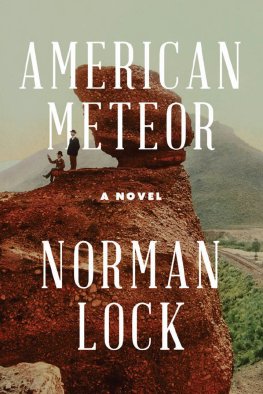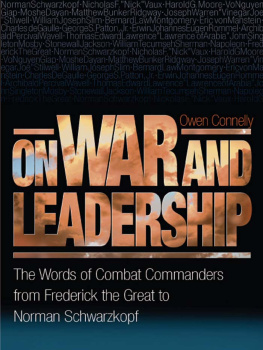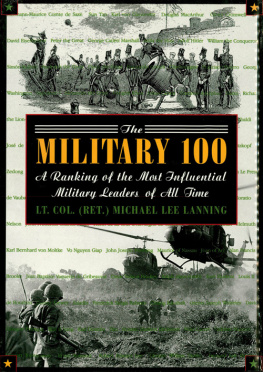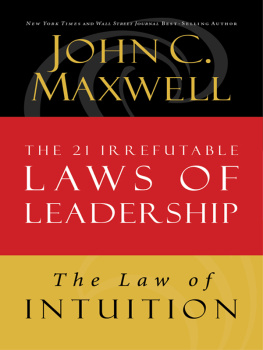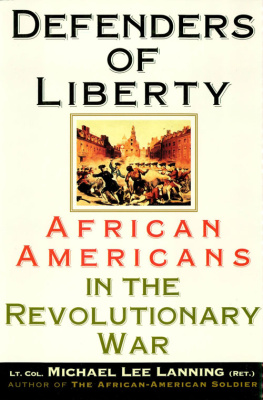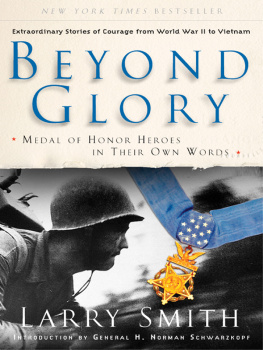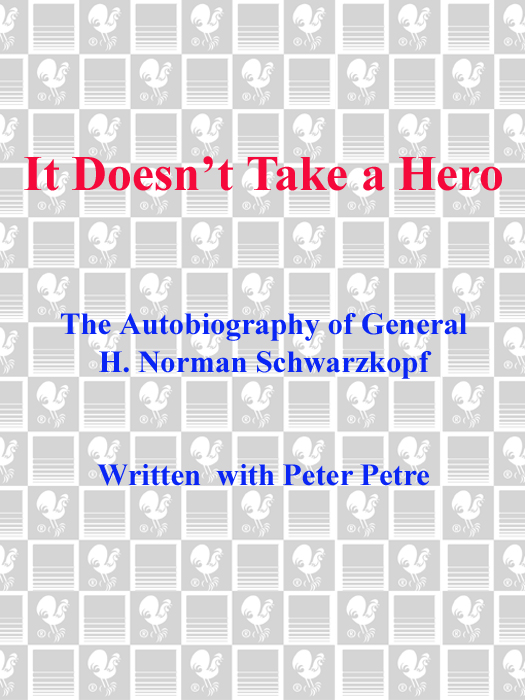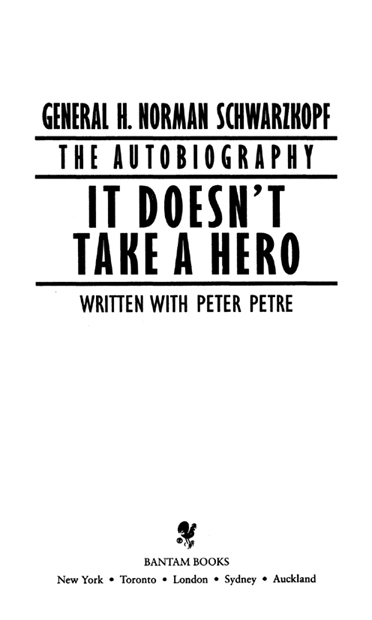From It Doesnt Take a Hero
My fathers saber was a sacred thing in our family. We called it his West Point sword, because hed gotten it the year he graduated, in 1917. Duty, Honor, Country, the West Point motto, was his creed, and it became mine.

The son of a general who led the Lindbergh kidnapping investigation and served President Roosevelt on a special assignment in Iran, Norman Schwarzkopf was well prepared for the primary goal of his young life: West Point.
But Schwarzkopf faced disillusionment when he confronted the cynicism and incompetence of the real Army. He almost decided to leave the military. Instead he stayed to become part of the solution.

Frank and refreshingly candid a rattling good read.
The Tampa Tribune-Times
Surprisingly trenchant down to earth.
The Philadelphia Inquirer
This superb autobiography details the life of a genuine hero.
The Globe and Mail (Toronto)
[In Vietnam] I had to be a complete son of a bitch to get any results, which often entailed losing my temper five or six times in a day. Being calm and reasonable just didnt work.

Leading soldiers into battle for the first time in Vietnam, Schwarzkopf gained a deep respect for his comrades. But he knew too many lives were being lost unnecessarilyand hated the rift that divided his country when Americans at home turned their backs on the war.

A superb portrait of the modern American soldier. His straightforward, vivid account of his two tours in Vietnam provides one of the best jungle-eye views of the war.
The Washington Post Book World
If there has been a healing in the nation following the Vietnam divisiveness, General H. Norman Schwarzkopf is one of the ones who can legitimately claim to have helped.
The Denver Post
[A] terrific read. Passionate, angry, funny. A dynamic storyteller with a disciplined mind that cuts away clutter to clarify pivot points.
The Toronto Sun
At midnight I went back to my office. I felt as if I were standing at a craps table in some kind of dreamId bet my fortune, thrown the dice, and now watched as they tumbled through the air in slow motion onto the green felt. Nothing I could do would change the way they landed.

An exhilarating series of commands ultimately led to Schwarzkopfs role as commander-in-chief of Allied Forces in the Gulf War. Here is the Generals behind-the-scenes account of how the allies waged war from a country deeply suspicious of foreigners. From his perspective we experience the sensitive negotiations with Israel and Saudi Arabia, the decisions that were sometimes hotly contested in Washington, the contributions of Colin Powell, Richard Cheney, and President George Bush, and the day-by-day, hour-by-hour tensions of being commander-in-chief under the gaze of the entire world.

Schwarzkopfs account of Desert Storm reads crisply and clearly. Itll make you feel good all over again.
St. Louis Post-Dispatch
An excellent book.General Sir Peter de la Billire, commander of the British forces in the Gulf War
IT DOESNT TAKE A HERO
A Bantam Book
PUBLISHING HISTORY
Bantam hardcover edition published October 1992
Bantam paperback edition / October 1993
Grateful acknowledgments is made to Ruth Ann Schwarzkopf for permission to quote from her story Daddys Girl on .
Speech quoted on from Ben Franklin in Paris, a musical play by Sidney Michaels and Mark Sandrich, Jr. 1965.
All rights reserved.
Copyright 1992 by H. Norman Schwarzkopf.
Maps designed by Natasha Perkel.
Library of Congress Catalog Card Number: 92-20762.
No part of this book may be reproduced or transmitted in any form or by any means, electronic or mechanical, including photocopying, recording, or by any information storage and retrieval system, without permission in writing from the publisher.
For information address: Bantam Books
eISBN: 978-0-307-76499-7
Bantam Books are published by Bantam Books, a division of Bantam Doubleday Dell Publishing Group, Inc. Its trademark, consisting of the words Bantam Books and the portrayal of a rooster, is Registered in U.S. Patent and Trademark Office and in other countries. Marca Registrada. Bantam Books, 1540 Broadway, New York, New York 10036.
v3.1_r1
Contents

PREFACE
T his book almost didnt get written. On the day of the Gulf War victory parade in Washington, D.C. in 1991, I attended a memorial service at Arlington Cemetery for the men and women who had died in Desert Shield and Desert Storm. I sat on the stage behind the President and looked out at an audience filled with families who had lost loved ones. The grief that marked their faces made me think that writing a memoir that included the Gulf War would only cause them more pain. But over the course of the day, as I talked with some of them, they surprised me by saying they wanted me to write. Two days later the same thing happened at the ticker tape parade in New York City. On the reviewing stand, family members of people who had died also asked, When are you going to write your book? We need to hear the full story. Without their encouragement, I never would have gone ahead.
My original goal was to model my account on the Personal Memoirs of U.S. Grantthe great two-volume work that, to my mind, is still the finest military history of the Civil War. But unlike Grants, my book was to be a full autobiography, not primarily the story of a war. Writing it turned out to be a more personal process than Id bargained for, and the following pages contain more emotion than their nineteenth-century model. That was the only way to tell the story, even though I had been taught at West Point that an officer should avoid any public display of feelings. For the entire first part of my career, I prided myself on being unflappable even in the most chaotic of circumstances. That guise lasted until Vietnam, where I realized that I was dealing with human lives and if one were lost, it could never be replaced. I quickly learned that there was nothing wrong with being emotional.
One of the toughest personal decisions I had to make was whether to discuss my mothers drinking in these pages. Her alcoholism had as much to do with shaping me as did the fact that my father was a general. During my boyhood her illness was our familys unspoken secret, and I carried it with me for twenty-five years before I felt I could mention it even to friends. Today there are many organizations and agencies to help alcoholics and their families; I hope that children of alcoholics reading this book will realize that they are not alone.


